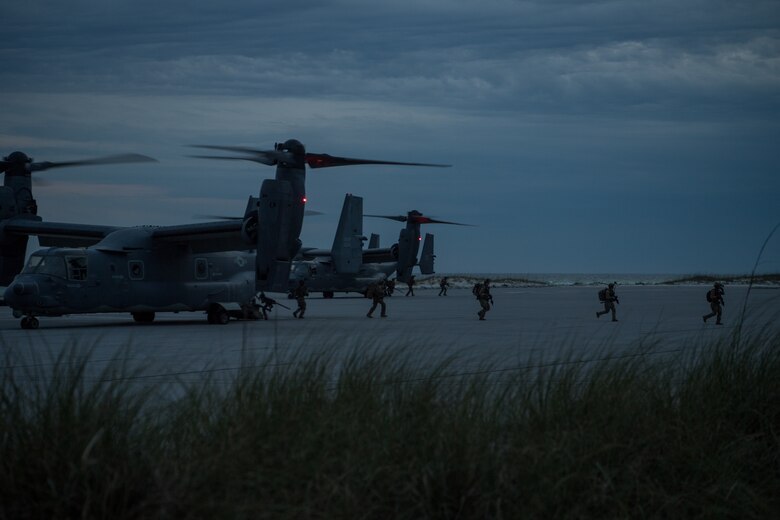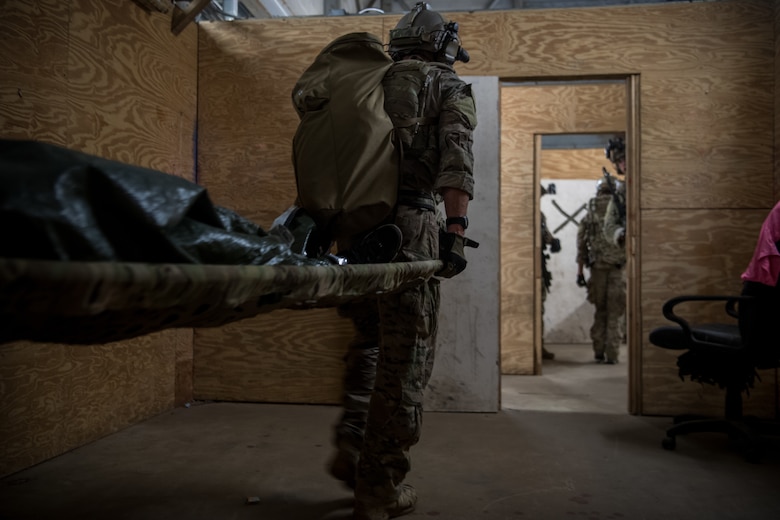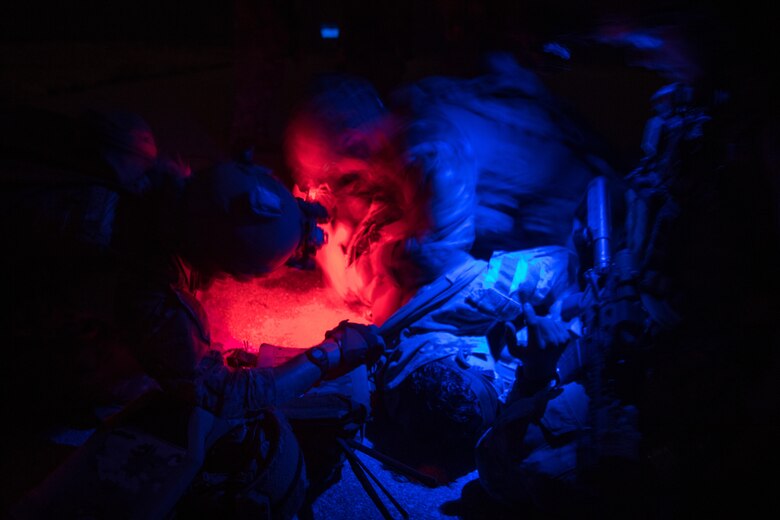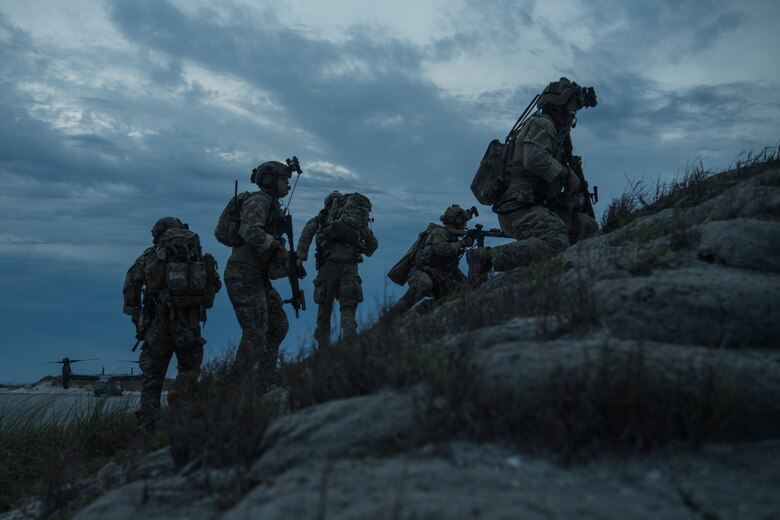Special Tactics Airmen from the 23rd Special Tactics Squadron conducted interoperability training with the 14th Weapons Squadron assigned to the U.S. Air Force Weapons School detachment at Hurlburt Field for a special operations force exercise, April 22.
"The recent training event was done in conjunction with the 14th Weapons Squadron as part of their curriculum to produce weapons officers from various aircraft in (Air Force Special Operations Command)," said Maj. Blake Jones, director of operations for the 23rd STS. "Their scenarios and full mission profiles necessitate the role of ground force as they train to conduct and support airfield seizures, noncombatant evacuations, hostage rescues and counter weapons of mass destruction operations. The 23rd STS picked up this great training opportunity after COVID-19 travel restrictions prevented other units from participating as planned."
The exercise is a part of the 14th WPS's demanding five and a half month syllabus, exposing students to a wide range of joint special operations and combat air force capabilities. Being able to move forward with the training allowed the iteration of Weapons School students to stay on track with their training timeline.
"Our students require close interaction with skilled ground forces throughout their training to graduate them as the recognized experts in (special operations forces) and (combat air forces) integration," said. Lt. Col. Jacob Duff, 14th WPS director of operations. "Our planned training partners, a different Special Tactics squadron and multiple Army special forces units, were unable to travel to Hurlburt (AFB) and the 23rd STS immediately stepped in to fill that gap. Without them, it would have been significantly more difficult to meet our training objectives and graduate the newest class of SOF weapons officers and enlisted advanced instructors."
The SOFEX also provided a unique opportunity for local Special Tactics Airmen to conduct multifaceted training with a volume of aviation assets otherwise not easily replicated outside of a larger exercise.
"Our recent participation allowed us to evaluate individual personnel and conduct training in mission planning, tilt-rotor assault, airfield seizure, landing zone establishment and control, terminal attack control, close quarters combat, personnel recovery and battlefield trauma care," Jones said. "This was important because it gave many junior enlisted and junior officer (Special Tactics) personnel a crucial repetition mission planning with some of the best aviators in AFSOC as well as the opportunity to execute, work through contingencies and lead in a high-fidelity scenario."
The units not only trained on the necessary skill sets needed to conduct a wide-range of special operations missions, increase lethality and maintain joint warfighting capabilities, but they were also tested on their ability to plan complex missions amid COVID-19 preventive measures.
"The combat capabilities we are tasked to provide are not changing, but the constraints are different now, so we must adapt," Jones said. "We are adapting how we train, but also adapting how we resource and plan that training over teleconferences and web-based planning applications."
In addition to reducing in-person mission planning, Special Tactics squadrons have implemented several techniques to maintain readiness while keeping health of operators at the forefront, including sanitizing equipment, using face coverings when needed, conducting internal evaluations on prioritization of missions, staffing smaller training groups and taking advantage of local training opportunities.
"Stopping all training is not a feasible course of action because the second and third order effects months down the line are far too costly in terms of readiness," Jones said. "Our squadron commits and deploys personnel operationally year-round, so we focused on ensuring we are still on track to field combat ready forces on time."
Special Tactics is U.S. Special Operations Command's tactical air and ground integration force, and the Air Force's special operations ground force; leading global access, precision strike, personnel recovery and battlefield surgery operations.

Special Tactics operators infiltrate a simulated target from CV-22 Osprey tilt-rotator aircraft during operability training with the 14th Weapons Squadron at Eglin Range, Fla., April 22, 2020. The training helped improve readiness and interoperability between special operations assets. Special Tactics is U.S. Special Operations Command's tactical air and ground integration force, and the Air Force's special operations ground force; leading global access, precision strike, personnel recovery and battlefield surgery operations. (U.S. Air Force photo by Staff Sgt. Rose Gudex)

A Special Tactics operator carries a patient on a stretcher to evacuate during an operability training scenario at Eglin Range, Fla., April 22, 2020. Special Tactics teams conduct personnel recovery missions, from rapid mission planning to technical rescue, treatment and exfiltration. With in-depth medical and rescue expertise, along with their deployment capabilities, Special Tactics Airmen are able to perform missions in the world's most remote areas. (U.S. Air Force photo by Staff Sgt. Rose Gudex)

Special Tactics operators roll a patient to check for simulated bullet exit wounds during operability training at Eglin Range, Fla., April 22, 2020. Special Tactics is U.S. Special Operations Command's tactical air and ground integration force, and the Air Force's special operations ground force; leading global access, precision strike, personnel recovery and battlefield surgery operations. (U.S. Air Force photo by Staff Sgt. Rose Gudex)

Special Tactics operators spread out on a berm to provide security at the landing zone and observe their target during operability training at Eglin Range, Fla., April 22, 2020. The training helped improve readiness and interoperability between special operations assets. Special Tactics combines the core skills of Special Operations Forces with the tactical integration of air power to find unique solutions for ground problems. (U.S. Air Force photo by Staff Sgt. Rose Gudex)






